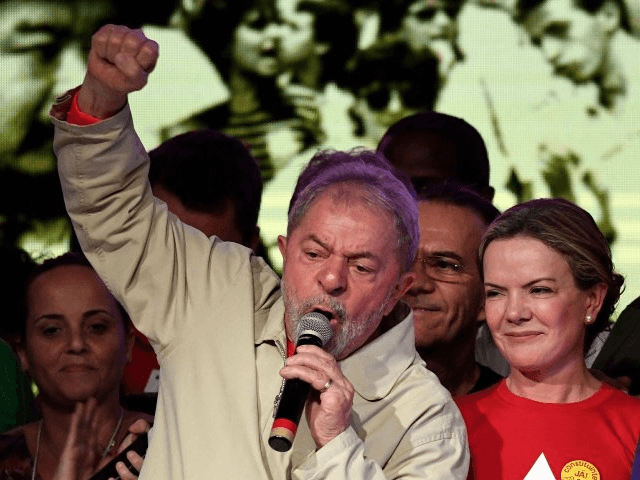Surrounded by supporters chanting “Lula, president!,” former Brazilian president Luiz Inácio Lula da Silva officially announced his candidacy in the 2018 presidential race, his first public statement since being convicted on corruption charges and sentenced to 9.5 years in prison.
In a statement broadcast on Facebook Live, Lula surrounded himself with socialist Workers’ Party (PT) supporters and stated definitively, “I will claim the right to apply as a postulant to the Presidency in 2018.” He demanded a “process against those who do not tell the truth in our country” and denied all charges against him.
“Whoever thinks this is the end of Lula will have egg on their face,” Lula told those assembled. “In politics, the only ones who have the right to decree my end are the Brazilian people.”
“If someone thinks that, with that conviction, they got me out of the game, they can know that I’m in the game!” he added.
Lula demanded “my enemies, especially in the media” to present “proof” of his corruption, dismissing the extensive ruling by Judge Sergio Moro finding that Lula had personally profited to the tune of over one million dollars from a sprawling corruption scheme run through the state-run oil company Petrobras. He challenged Moro, one of the most popular political figures in the country, to “account for” his ruling “not to me, but to history.”
To his challengers and “right-wing economists,” he asserted, “you are not competent to run this country.”
The fiery press conference followed one of the most tumultuous days in Brazilian political history. On Wednesday, Moro—who is leading the investigation into “Operation Car Wash,” the aforementioned corruption scheme at Petrobras—sentenced da Silva, who served as Brazil’s head of state from 2003 to 2011, to nine and a half years in prison for accepting over $1.1 million in Petrobras bribes. At the heart of the investigation was Lula’s purchase of a luxury triplex apartment later found tied to a construction company that benefitted from Petrobras contracts.
Moro’s investigations found that, under Lula, the federal government grossly overpaid on multiple Petrobras contracts. The contractors benefitting would then kick back millions to the politicians ensuring the payments would go through. Over two hundred people of all political stripes have been indicted on crimes related to Operation Car Wash.
Prior to his conviction on Wednesday, polls showed Lula as the frontrunner in the 2018 elections, largely based on name recognition and mass corruption arrests in the ruling Brazilian Democratic Movement Party (PMDB). Moro’s ruling also imposed a 19-year ban on Lula running for public office.
Moro did not call for Lula’s immediate arrest, however, calling such an event a potentially “traumatic” episode in Brazilian history. Lula is out on appeal and has a chance to overturn his conviction before an appellate court. Until then, he can still campaign for president.
Taking advantage of this limited window between conviction and appeal, leftist supporters of da Silva congregated in Sao Paulo Wednesday night, forming drum circles and chanting his name. The small group was met by anti-Lula protesters who took to the streets to celebrate his conviction. Both assemblies remained peaceful.

COMMENTS
Please let us know if you're having issues with commenting.